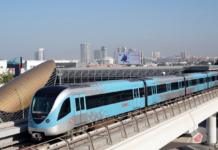By Ramola Talwar Badam www.thenational.ae
DUBAI // The Metro has become a daily habit that users say they cannot give up even if it often takes longer to get to work and they don’t always get a seat.

A year after its launch, commuters say the Metro is vital to their travels. Some have ditched their cars, while others such as Mahesh Sadh, 29, an accounts executive, say they will never buy a car because of the independence and economy the Metro offers.
“For a middle-class person like me, what is the need for road transport when I have the Metro?” Mr Sadh, who works for a transport company, said. “I’m tension free. Before it was a rush from home. Now I know if I’m late the next Metro is in the next eight minutes. It is a big comfort for me.”
He takes a bus from his home in the downtown Bur Dubai area to the Khalid bin al Waleed station. A 25-minute trip gets him to his office near the Noor Islamic Bank station. Though his commute now takes 20 minutes longer, he spends less than half the Dh500 or so a month he was laying out on private transport.
“I was so excited when the station near my office opened, I spread the happy news to all,” he said. “I have complete freedom of time and it is worry-free because I don’t get tense about being two minutes late at the pick-up point.”
Claire Ruru, a New Zealand expatriate, also enjoys the Metro’s relaxed pace compared with the frenzy typical of Dubai roads during rush hour. She is now a regular user, although it takes more than twice the time commuting by cab from her Jumeirah Lakes Towers (JLT)home to the Dubai Marina Metro station and on to the World Trade Center station. Using the gold class helps her to avoid the early morning seat scramble.
“It’s a more relaxed way to travel,” Ms Ruru, 40, said. “I use the time to read and catch up with work. The key is it’s handy to where I live and work. It sometimes takes me longer to get to work but I enjoy the Metro far more. Even travelling by gold, I pay a quarter of the price of what it costs by cab.”
A taxi ride could be as much as Dh50 each way, she said. Ms Ruru is among thousands of Metro users near residential areas such as Jumeirah Lakes Towers and Sharaf DG waiting for these stations to open.
“I’m desperate for JLT to open,” she said. “It would be a minute’s walk to the station.”
The Metro is also a boon when guests stay. When her 17-year-old daughter visited Dubai on holiday from school, they used to hop into cabs. Now they use the Metro. “I feel happier with her using the Metro,” Ms Ruru said.
Taking the train to work also makes Chitra Jayabalan’s day easier, since it rules out the search for parking near her office in the busy Garhoud area and paying steep fees once she finds it. It also stirs up memories of rides back home in the southern Indian city of Chennai.
“It feels good taking the train to work,” she said. “Travelling by train gets in your blood. It’s so convenient.”
Ms Jayabalan, a bank manager, was among Dubai residents who travelled on the Metro the day after it opened on September 9 last year. She car-pooled to Deira City Centre along with colleagues from Russia, Pakistan, Indonesia and India to use the system.
“It was a joyful ride,” she said. “We thought we must experience it on the first day. I still have the red ticket we bought. All of us signed it as a memory.”
Unlike those who travel the entire length of the Metro to work, Ms Jayabalan’s workplace near the GGICO station is a mere two stops away from her home near Al Rigga station. She still prefers to leave her car at home as a contribution to reducing her carbon footprint and conserving fuel.
“The Metro is fabulous because it cuts across income groups – the experience is the same for everyone,” Ms Jayabalan said. “It takes them out of their comfort zone and out of their cars.”



















